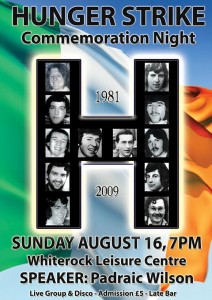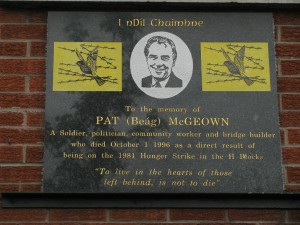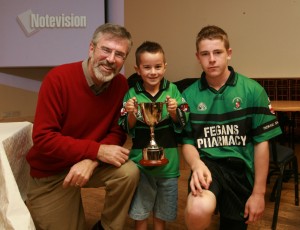Padraic Wilson speaks at Hunger Strike commemoration in West Belfast
Published: 18 August, 2009
‘This morning the 40th anniversary of the burning of Bombay Street was remembered with a march retracing some of the main sites of the August 1969 pogroms. Along with the Battle of the Bogside those events were the catalyst that radicalised a generation of men and women and brought them into armed conflict with the Orange state and the British Empire.
‘This afternoon in Tyrone we gathered to remember the deaths, on hunger strike, of 13 Irish Republicans spanning the period from the 1940’s to 1981 in prisons across Ireland and in England.
‘Last week I was in the audience at the premiere of a play, Young Guard of Erin, that focused on the lives of 10 young republicans, members of Na Fianna Eireann and Cumann na gCailiní, from Ballymurphy and Turf Lodge, who died in the period spanning the 1940’s to the 1980’s. The play was a brilliant piece of drama and a fine tribute to the memory of those young people.
‘Tonight we’ve come together to primarily celebrate the lives and honour the commitment of our comrades and friends who died on hunger strike in the H-Blocks in 1981. All of these events are of course linked and all of them have had an influence in one way or another upon each of us.
‘Over the years a lot has been written and said about the hunger strike of 1981. Some notable pieces of work stand out such as Nor Meekly Serve My Time, Ten Men Dead or the recent film, Hunger.
‘But not all of what has been written or said is deserving of praise, in particular stuff that originated from the political and media establishments.
‘They vilified and demonised our comrades, their families and each and every one of us.
‘They provided a rationale for the murderous attacks against the Relatives Action Committees and others.
‘In recent times there have been attempts, led by some of the same people, to rewrite the history of that period.
‘If we didn’t know better we could be forgiven for thinking that these people actually cared about our comrades or their families.
‘Whatever else we disagree about lets be clear about a number of things:
•The British Government, led by Thatcher, was not an honest broker trying desperately to find a solution to a situation for which they had no responsibility.
•Thatcher had shown quite clearly in December 1980, when the opportunity for a solution to the situation in the H-Blocks and Armagh arose, that she had one intention and one only; that was to demoralise us, crush us, and to deliver a death blow to republican resistance. According to her we had played our last card…the game was still going in Brighton in 1984, Maggie.
•She and her allies failed inside the prisons and they failed on the outside.
•They failed because we, and that means those of us who were in prison, those of you who fought and campaigned on the outside and those of you who provided the resources for that, all of us refused to be intimidated, refused to bow down and refused to be criminalised.
‘While we expect it from those quarters there are others, some of them former comrades, who have aligned themselves with this revisionism. The logic of their position is that our comrades were like sheep being led aimlessly along.
‘That is an insult and it needs challenged.
‘Bobby Sands was our O/C and he led us. Our comrades, Frank, Raymond, Patsy, Joe, Martin, Kevin, Kieran, Tom and Mickey, stepped forward to join him and they showed us leadership.
‘Their families said it best themselves after a recent meeting in Gulladuff in South Derry when they stated ‘Our loved ones made the supreme sacrifice on hunger strike for their comrades. They were not dupes. They were dedicated and committed republicans.’
‘Of those dedicated and committed republicans Kieran Doherty, Big Doc, was the person I knew both outside and inside of prison. I’ve said before that when you witnessed Doc in action you knew he didn’t need a title or rank to give leadership, it came naturally. He oozed confidence.
‘His stature and his determination made him stand out.
‘Doc was single minded in what he was about, there was no ambiguity. That same dedication and commitment was to be found in each and every one of the ten lads. No-one led them along. They all showed us leadership.
‘One of our lifelines in the Blocks was the ability to send out and receive communications. The visits were the means to do that. We only had one visit a month for half an hour. So a system was put in place to ensure that the visits were spread out in a way that resulted in a series of visits each day to each Block.
‘Somebody somewhere discovered that if a prisoner appealed their case then they were entitled to a 15 minute visit every day. So naturally men were encouraged to submit an appeal just to open up a potential line of communication. The system responded with a rule that stipulated that such visits were for legal purposes only. To make sure that this rule was enforced a screw would literally stand in the visiting box and if anything was said that was not strictly about the legal case then the visit was stopped and both the prisoner and the visitors were removed.
‘Visitors would come up every day and endure all of the aggression and hassle, going over the same standard conversation, waiting for the opportunity to pass a comm or a parcel of tobacco.
‘The prisoner had to endure two mirror searches and the accompanying physical ill-treatment, the severity of which depended on the particular screws on duty.
‘Big Doc was on appeal visits and he was one of the masters at being able to secure comms and tobacco.
‘Doc became a focus of attention for the screws, especially on the return journey to the Block. The search on arriving back on the wing was usually more aggressive and physical.
‘There was a particular SO who took a sadistic interest in Doc and he wasn’t happy that other screws were a bit hesitant about tackling Doc. He attempted to orchestrate a situation during a return search whereby a few screws tried to have a go at Doc. As soon as he went into the search cell, cell 26 as it was called, Doc knew what was up and he positioned himself in the corner inviting them to come at him face on. They declined the offer.
‘The next day after an appeal visit when Doc entered cell 26, there was a screw in each corner and three around the mirror that was on the ground. They forced him over the mirror and tried to make him squat over it. He resisted.
‘Remember this is a situation where there are up to 7 or 8 fully clothed and kitted out screws against one naked man.
‘Frustrated with the screws inability to bend Doc the SO stepped in and between them they rendered him semi-conscious until he went down. He then scurried out of the way before Doc could recover.
‘On the mural to Doc at Slemish Way there is a quote from one of his letters where he paraphrases Terence Mac Swineys’ quote “It is not those who can inflict the most but those who can endure the most who will conquer”. They inflicted brutal and degrading treatment like that on us on a daily basis. We endured it because we had a purpose, a unity of purpose. Any act of resistance has to have a purpose. Any struggle has to have a purpose, a clear objective.
‘The protests in the H-Blocks and Armagh were great levelers. They put all of the prisoners on protest on a level playing field. No-one had privilege or advantage over the other. We all endured the same deprivations. The only thing that tended to alter or change at times was the extent of the brutality that was visited upon you by the screws.
‘The decision to embark upon hunger strike was not one that was taken lightly. The human cost on each person and on their family was immeasurable. That alone was a big enough burden for anyone to carry.
‘But it also carried with it the justification of our struggle and the defence of the integrity of that struggle. The elections of Bobby Sands, Kieran Doherty, Paddy Agnew and Owen Carron sent shock waves through the political establishments in Ireland and in England. Internationally Britain’s role in Ireland began to be questioned as never before.
‘Recently I was in the Middle-East along with two former hunger strikers, Pat Sheehan and Raymond Mc Cartney. We were taken into South Lebanon and brought to the site of a former Israeli prison that was jointly run by them and Lebanese collaborators. It was infamous as a site of torture and brutality for the Palestinian and Lebanese men and women who were held there. Some of them died within its walls.
‘It is now a museum dedicated to the memory of those who were imprisoned in it. Our guide was a Palestinian fighter who had himself been imprisoned and tortured there.
‘When we were introduced to him and our backgrounds explained, he said two words “Bobby Sands”.
‘So the legacy of the hunger strike continues to inspire people and to instill in them ‘an meon saoirse’ – the spirit of freedom.
‘A lot has happened and changed since 1981. Each year we lose comrades from those days. People like Jimmy Duff, Cormac MacAirt, Christine Beattie and Sean McKenna.
‘The nature and expression of struggle and resistance have also changed. And, I believe, rightly so.
‘Our republican objectives still guide us.
‘Those objectives have not yet been achieved or realised.
‘The efforts of our opponents to defeat us will continue.
‘As we shape and redefine the nature of our strategies and tactics so will they.
‘Nothing has ever been given to us on a plate.
‘We’ve had to organise and struggle for every inch.
‘Irish unity won’t come about unless we make it happen.
‘That means working for it.
‘That work can accommodate us all. It’s true that there is no part too big or too small.
‘I’ve been asked at various times over the years if it was all worth it. I’ve always responded that everything that I’ve experienced and all that I’ve been a part of were necessary and worthy. Mindful that some people might think that’s an easy answer to give because I’m alive and well, I can only say that any other response would be a lie and a betrayal.
‘I committed myself to fulfilling the legacy of our comrades in whatever way that I could. Everyone has to find their way of fulfilling that legacy.
‘I mentioned the play ‘Young Guard of Erin’ earlier. While the play was on stage I looked around the hall and it was clear to see the emotional impact that the drama was having on the families present. By the end of the play the sense of pride that filled the hall was palpable.
‘We are rightly proud of our patriot dead. We should always be so. We are privileged to have had them in our lives or to have known them. At events like this tonight we remember them and celebrate their lives.
‘So tonight let’s celebrate their lives and enjoy the company and the craic.
‘Tomorrow let’s get on with fulfilling their legacy. That’s the best memorial we can create. Mar sin, bigí linn agus le chéile leanfaimid ar aghaidh agus beidh an bua againn, go raibh maith agaibh, sin é.’
Sourced from West Belfast Sinn Fein
 LEADING Belfast republican Padraic Wilson is to speak at a Belfast Hunger Strike Commemoration night in the Whiterock Leisure Centre on Sunday, 16 August.
LEADING Belfast republican Padraic Wilson is to speak at a Belfast Hunger Strike Commemoration night in the Whiterock Leisure Centre on Sunday, 16 August. After being released in 1999 he became active again in Sinn Féin and currently holds the position of Director of International Affairs.
After being released in 1999 he became active again in Sinn Féin and currently holds the position of Director of International Affairs.
 Joe McDonnell’s grandson Caolan presents the Joe McDonnell Cup to Captain Gary Lennon of Sarsfields
Joe McDonnell’s grandson Caolan presents the Joe McDonnell Cup to Captain Gary Lennon of Sarsfields It has withstood the blows of a million years, and will do so to the end.
It has withstood the blows of a million years, and will do so to the end.